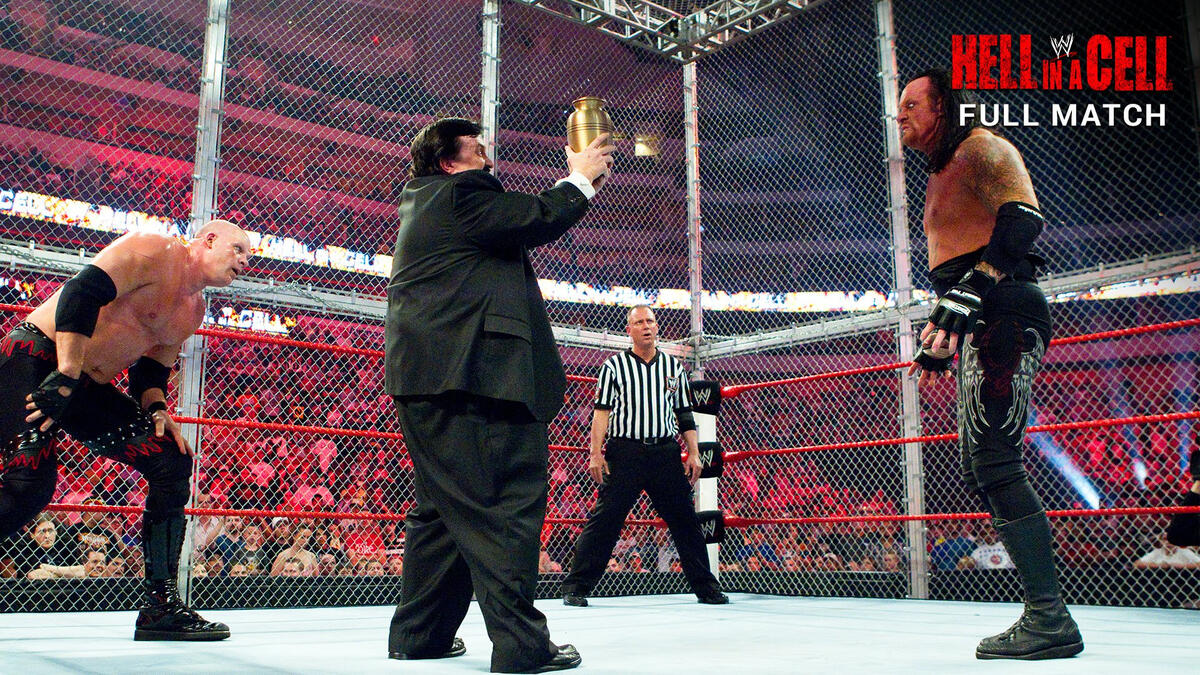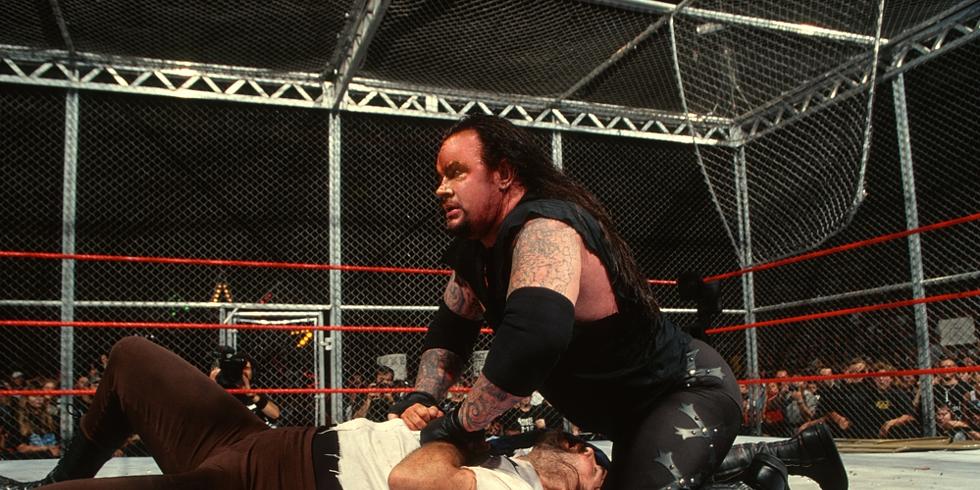It was the summer of 1998, and the wrestling world was buzzing. The WWF, now WWE, was riding a wave of popularity thanks to the “Attitude Era,” a period marked by its edge, its rebelliousness, and its unwavering focus on storytelling. In the heart of this storm was a feud unlike any other: Mankind, the broken, battered, and unpredictable wrestler, versus The Undertaker, the gothic, supernatural force of nature. The stage was set for a clash of titans, a battle for the ages, that would take place within the unforgiving confines of the Hell in a Cell. This was more than just a match; it was a collision of personalities, a clash of philosophies, and a spectacle that would forever alter the course of professional wrestling.

Image: www.wwe.com
Why this match? Why this structure? For many, it was about the stories, the characters, the emotions, and the sheer spectacle, the unbridled brutality that could only be unleashed within the confines of the Hell in a Cell. The narrative was about one man, Mankind, trying to break free from the darkness that had consumed him, while the other, The Undertaker, represented the cold, unforgiving hand of fate. And as the match progressed, the stakes went higher, the violence intensified, and the crowd roared in a symphony of awe, fear, and anticipation.
The Origins of a Legendary Match
To understand the significance of Mankind vs. Undertaker: Hell in a Cell, we need to delve into the context of their feud. It wasn’t merely a clash of wrestling styles; it was a psychological battle, a war of attrition that had captivated audiences for months. The story revolved around Mankind, a character struggling with a tortured past, constantly tormented by his inner demons. He was a man perpetually fighting to stay afloat, to find redemption in a world that seemed determined to break him. Opposite him stood The Undertaker, a force of nature, a dark angel, who seemed to revel in the pain and suffering of his opponents. His presence was a reminder that fate was a cruel mistress, and even the most resilient soul could be consumed by its darkness.
The feud escalated rapidly, fueled by a series of brutal encounters, each escalating in intensity and danger. The psychological warfare reached a fever pitch, with both men pushing the boundaries of acceptable behavior in a world where violence was a language spoken fluently but rarely understood. The stage was set for a confrontation that would leave a mark on the history books and forever change the landscape of professional wrestling.
The Hell in a Cell: Symbol of Brutal Storytelling
A Cage of Consequences:
The Hell in a Cell, a steel structure that encases the ring, was more than just an elaborate prop; it served as a symbol of the brutal story being told. Its unforgiving nature reflected the intensity of the feud, the desperation of the characters, and the unwavering determination of both men to end the conflict, no matter the cost. The cage served as both a barrier and a weapon, trapping the wrestlers within its confines and allowing them to unleash their full fury without the constraints of a traditional match.

Image: stillrealtous.com
Breaking the Boundaries:
The Hell in a Cell match pushed the limits of what was considered acceptable in professional wrestling. The violence was palpable, the brutality visceral. The match was a testament to the skill and dedication of the performers, who embraced the dangers of their craft, pushing themselves to the absolute limit in the pursuit of a compelling story. The crowd was enthralled, witnessing a spectacle that blurred the lines between reality and entertainment, a battle that left no doubt that they were watching something truly extraordinary.
The Infamous Fall:
The climactic moment of the match, when Mankind was thrown off the top of the cell, became an iconic moment in wrestling history. The fall was not simply a display of athleticism; it was a symbol of the desperation, the sheer brutality that characterized the feud. The sight of Mankind falling through the air, his body limp, his spirit seemingly broken, sent shockwaves through the crowd. It was a moment that defied expectations, a moment that would be etched in the memories of every fan who witnessed it.
The Legacy of Mankind vs. Undertaker
The impact of the Mankind vs. Undertaker: Hell in a Cell match resonates to this day. It’s not simply remembered for its brutality, but for its storytelling, its emotional impact, and its sheer audacity. The match set a new standard for professional wrestling, demonstrating the potential for storytelling within this unique form of entertainment. The match’s legacy continues to inspire new generations of wrestlers, serving as a reminder that compelling stories can come from the most unexpected sources.
Expert Tips for Wrestling Fans
The Mankind vs. Undertaker Hell in a Cell feud is a testament to the power of storytelling in wrestling. For fans, the key is to focus on the narrative being told.
- Pay attention to the characters’ motivations: Why are they fighting? What are their goals? Understanding their backstories can enhance your appreciation of the matches.
- Embrace the theatricality: Wrestling isn’t real, but it’s real entertainment. Allow yourself to be transported by the spectacle, the drama, and the characters.
- Enjoy the moments that transcend the physical: Look for moments that are both entertaining and emotionally engaging. It’s those moments that truly stick with us long after the match.
FAQ
Q: Was Mankind vs. Undertaker: Hell in a Cell a work or a shoot?
A: This match was absolutely a work, which is the wrestling term for a pre-determined outcome. While the match contained brutal and potentially dangerous elements, it was still a scripted performance, and the fall through the cell was carefully choreographed.
Q: Did Mankind actually get hurt during the match?
A: While the fall from the top of the cell was carefully choreographed, Mankind, played by Mick Foley, did sustain injuries during the match. He suffered a concussion as well as a dislocated shoulder. However, he continued to perform throughout the match, showcasing his commitment to his craft.
Q: Why is this match so famous?
A: This match is famous due to its sheer brutality, the undeniable emotional impact, the story being told, and its contribution to the Attitude Era. Along with the match’s place in wrestling history, the iconic fall from the cell became one of the most memorable and talked about moments in wrestling history.
Mankind V Undertaker Hell In A Cell
Conclusion
The Mankind vs. Undertaker: Hell in a Cell match is a hallmark of professional wrestling. Its brutality, its storytelling, and its emotional impact cemented its place in the history of the sport. The match was a testament to the power of storytelling and the dedication of performers who truly embody their characters. Are you ready to immerse yourself in the wild world of wrestling, where captivating narratives collide with breathtaking athleticism? If you’re looking for a real-life fairy tale where monsters and heroes clash, where the lines between reality and entertainment blur, and where the crowd fuels the action, then wrestling might be your perfect escape.






